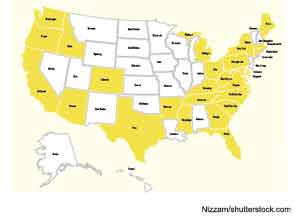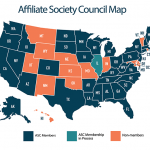
“All politics are local” is a common phrase used by former U.S. Speaker of the House Tip O’Neill. The same can be said for healthcare issues, and as the Affordable Care Act continues to be implemented, more issues will affect physicians at the state level. The ACR created the Affiliate Society Council (ASC) to work with state and local societies on regional issues. Representatives from 18 states met in early February to discuss issues that are affecting rheumatology practices and state societies.
An important issue that affects all rheumatologists is increased Medicaid payments for primary care and related subspecialists. Physicians must make an attestation that they meet the qualifications in order to receive increased payments. Qualifying physicians are defined as physicians with a specialty designation of family medicine, general internal medicine, or pediatric medicine or specialists recognized by the American Board of Medical Specialties. Additionally, physicians must attest that 60% of their Medicaid claims for the prior year were for the evaluation and management codes specified in the regulation. The representatives were encouraged to share this information with members of their state societies.
The ASC also discussed other state legislation that is affecting rheumatologists. There are several states that have passed a standard prior authorization process. Other states were interested in the legislation and how it passed. The Florida Society of Rheumatology (FSR) has been successful in hiring a lobbyist and creating a state political action committee. The FSR is actively advocating at the state level. Other state societies were interested in learning how the FSR reached this level of involvement. The New York State Rheumatology Society representative reminded everyone of the tier 4 insurance policy legislation that was passed in New York a couple of years ago. The ACR is now trying to pass similar legislation at the federal level, but state societies are encouraged to support or bring similar legislation forward, too.
Insurance issues are always discussed at the meeting; they are like a bothersome mosquito that continues to buzz around your ear and frequently draws blood. The state society representatives are discovering that, by establishing state insurance committees, members can work together with insurance carriers to combat burdensome policies. The South Carolina Rheumatism Society was one of the first societies to create an insurance committee. They now have several examples where they have gone toe to toe with insurance companies and have come out victorious. The ACR Insurance Subcommittee also is happy to help with these issues, and has sent letters to insurers on several occasions.
Network, Learn, Discuss
The ASC meetings go beyond health policy issues. All of the state and local societies have meetings that allow the rheumatologists in the state to get together to network, learn about rheumatology advances, and discuss complex issues. There was great concern that the state meetings are not attracting academic physicians. The physicians in private practice discussed the importance of networking and learning from all physicians in the state. Representatives tried to brainstorm ways to encourage participation at the meetings.
Are you an academic physician? What would entice you to attend a state society meeting? The state societies are trying to increase the educational value of the sessions. There were discussions about showing some of the past ACR annual meeting presentations at ASC meetings through SessionSelect. Another bonus of attending the state society meeting would be earning continuing medical education credits!
The representatives discussed how the various states run their state and local societies. Some of the societies have monthly academic meetings with one yearly meeting, and other societies just have a yearly meeting. The meetings tend to be a mix of educational and policy sessions. As with any meeting, the hardest part is trying to get people to attend. The ACR assists in getting the word out by sending three to four statewide e-mails a year for the state and local societies.
Don’t Miss Out
To get involved with your state society, contact your ASC representative. All the state and local societies are listed on the ACR website at www.rheumatology.org/ASC. Many states also have list serves where members can post issues affecting their state and also learn about upcoming educational programs. To sign up for a list serve, visit www.rheumatology.org/Membership and click on “List Serve Communities.”
For questions or additional information on joining the ASC, or assistance starting your own society, contact Cindy Gutierrez, MBA, senior specialist, practice management, at [email protected] or (404) 633-3777, ext. 310.

